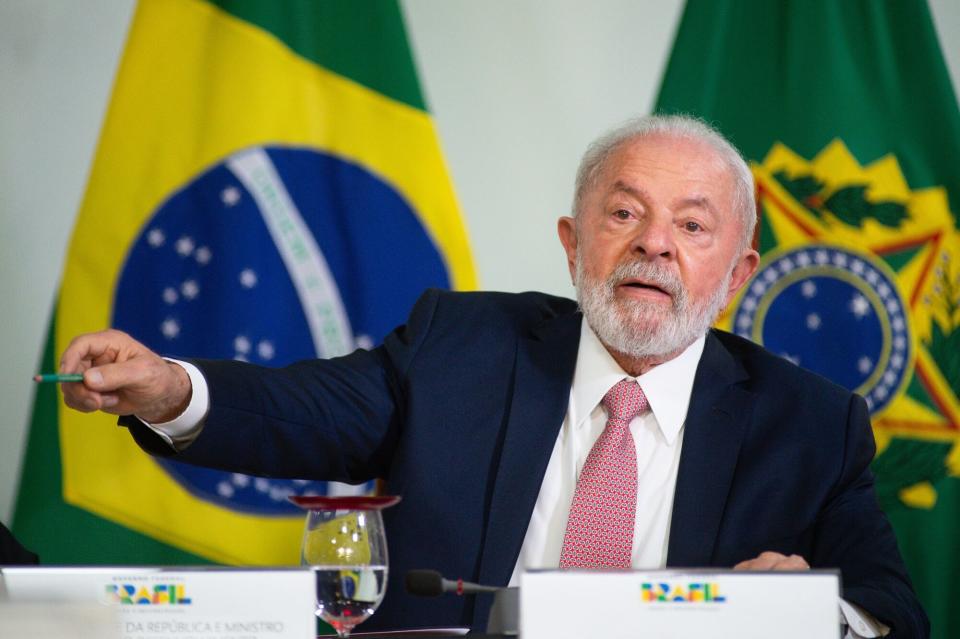Brazil’s Lula Now More Likely to Keep Zero-Deficit Goal, Eurasia Says
(Bloomberg) -- It is increasingly likely that Brazil’s government will maintain its zero-deficit fiscal target for 2024 despite President Luiz Inacio Lula da Silva’s doubts about the goal’s importance, according to the Eurasia Group.
Most Read from Bloomberg
Wall Street Divided Over Just How Aggressive Fed Cutting Will Be
UBS Strategists See Far Deeper Fed Rate Cuts Than What Markets Are Pricing
US Inflation Report to Keep Fed Leaning Toward More Rate Hikes
Lula’s late October questioning of his own finance minister’s aim of eliminating next year’s primary budget deficit, which excludes interest payments, led many analysts to predict the government would ultimately abandon the goal, said Christopher Garman, the managing director for the Americas at the New York-based political risk consultancy.
But that has changed in recent days amid signs that Finance Minister Fernando Haddad may be succeeding in his attempts to beat back a pressure campaign from other Lula allies who want to adopt a looser target, Garman said in an interview.
Haddad’s attempts to delay a decision until 2024, when the government will have a clearer view of its revenue outlook for the year, appear to be “gaining more traction,” he said, adding that “the bias now is to maintain” the goal.
Read More: Brazil’s Zero-Deficit Goal Under Heavy Fire From Lula’s Allies
The budget target, along with a new fiscal framework law meant to help shore up Brazil’s finances, is key to Haddad’s attempt to assuage market fears about the leftist Lula’s spending plans. A deadline for amendments to the 2024 budget plan will this week offer lawmakers — including some members of Lula’s Workers’ Party — their first chance to propose alternative goals.
Investors have for months expressed skepticism about Brazil’s ability to hit the target, especially as Haddad has struggled to convince Congress to approve measures that would help generate the 168 billion reais ($34.2 billion) in new revenues his budget proposal projects he needs to achieve his aim.
But an official change would worsen a market outlook that improved upon the passage of the fiscal framework earlier this year, and cast doubt on the government’s commitment to the spending rules.
“If the government changes the target, and Congress accepts that, it will affect the credibility of the new fiscal framework,” said Evandro Buccini, a partner at Rio Bravo Investimentos.
Altering the goal now, Garman said, would increase political pressure for more spending. But if Haddad succeeds in postponing a decision until next year, it would give him additional time to push for the approval of measures that could strengthen public accounts, while also allowing the government to monitor the performance of tax revenues over the coming months.
“Tax revenue may still save the day” for the zero-deficit target, Garman said.
Other analysts still regard a change as more likely: “We expect the fiscal target to be reviewed to a 0.5% deficit, and that would still be an ambitious goal,” said Marcela Rocha, the chief economist at Principal Claritas.
And while Eurasia sees increased odds of a more austere fiscal goal, the decision over whether to change it remains a toss-up, Garman said.
Another big issue for investors, he said, is the spending approach Lula will take in 2024, when Eurasia forecasts a drop in his popularity amid sluggish economic growth and less-benign food inflation.
“The president has low tolerance to fiscal restrictions, and that is a negative signal for the economic team,” Garman said.
Most Read from Bloomberg Businessweek
Everything Biden and Xi Need From Their Summit—Starting With Each Other
US Veterans Got a Mortgage Break. Now They’re Losing Their Homes
A German Startup Races Google to Develop a Universal Translator
©2023 Bloomberg L.P.

 Yahoo News
Yahoo News 


